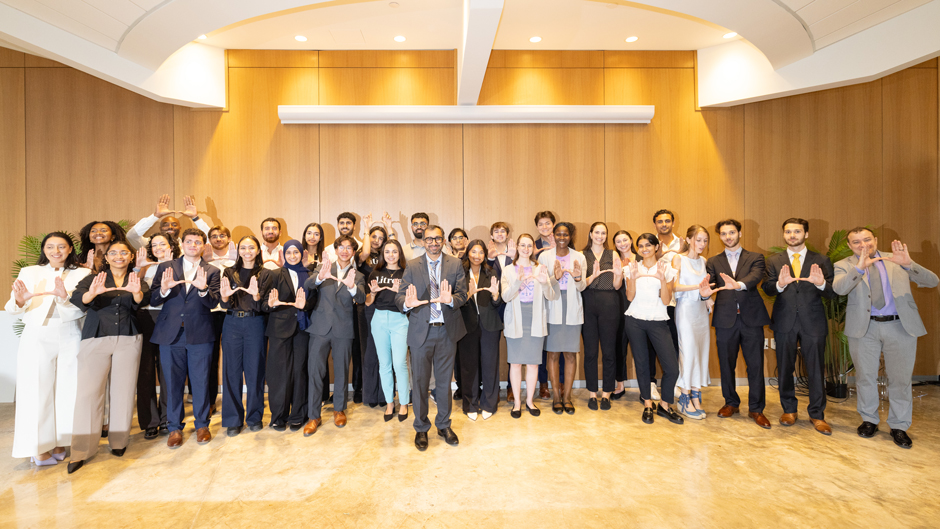Raghad Al-Kandari was moving into her apartment a few summers ago when she saw her mom’s skin turn flush and watched her start sweating, even though they were indoors.
Like millions of other women, her mother was experiencing a hot flash. And while Al-Kandari rushed to get her some ice water and lower the air conditioning, she felt pretty helpless to ease her mother’s discomfort.
“I witnessed firsthand how intense her hot flashes were and how profoundly they affected her quality of life,” said Al-Kandari, whose mother was visiting from their native Kuwait. “It was heartbreaking to see how limited the options were, with most women being told to either go on hormone replacement therapy or drastically change their lifestyles."
Soon after, Al-Kandari and three of her biomedical engineering classmates decided to create a solution for the many women suffering through these episodes, which often accompany the onset of menopause. They created a discreet wearable cooling vest called VasoPass, that can help relieve hot flashes by sensing them on the skin, and immediately offering a cooling sensation through a device that fits under a shirt.
Their ingenuity helped the team of young biomedical engineers win $100,000 to further develop VasoPass as part of the University Student Startup Accelerator, or USTAAR’s second annual pitch competition. It was one of five student teams that earned the same grant through USTAAR this spring.
Funded through a generous donation from University of Miami alumni brothers, Angel and Victor Alvarez, the USTAAR student incubator began in early 2024. Since then, 30 student teams have won $10,000 in the fall semester, and benefited from mentoring through the program. These recipients then compete for a larger prize in the spring to further improve their prototypes.
“Our program expanded from 22 student startups last year, to 51 applicants this year, with the top 11 presenting at our annual pitch competition and demo day this spring,” said Suhrud Rajguru, director of USTAAR, and a professor of biomedical engineering and otolaryngology, as well as assistant vice provost for research workforce development. “The success of USTAAR is a testament not only to the hard work of our team, mentors, and partners, but also to the rising energy and demand for student entrepreneurship at the U.”
This year’s five winning teams were chosen by seven judges with business experience, both locally and at the national scale. Also at the pitch competition, held at Centennial Village, were faculty members, community supporters, as well as mentors from the Venture Mentoring Team, The Launch Pad, and the Startup Clinic at the School of Law, who work closely with the student entrepreneurs.
The winners were:
- Titl, a platform created to make home title assessment and transfers more efficient and affordable, by Ori Ohayan, an MBA student at the Miami Herbert Business School.
- SimuStride, an augmented reality system designed to help amputees regain motor skills and mobility before they receive a prosthetic and to combat phantom limb pain, created by biomedical engineering students Ben Broyles, Elissa Cimino and Aidan Scott Van-Deusen.
- ChargeBay, a software application that helps make EV charging profitable for commercial or apartment buildings. Created by Ansh Bhatt, an MD/MBA student at the Miller School of Medicine and the Miami Herbert Business School, and Manan Ahuja, their software system allows customers to pay for a charge for their EV cars while parking, but it also helps property owners offset the added electricity costs.
- VasoPass, a first-of-its-kind solution for helping women suffering from symptoms of menopause. VasoPass is a cooling wearable device that can be placed on the torso to instantly relieve hot flashes. Utilizing heat transfer technology, embedded sensors activate a circulated cooling mechanism the moment a hot flash is detected to discreetly deliver relief. It was created by Rachael Robbio, Cheyenne Clelland, Raghad Al-Kandari, and Sofia Ponce, all biomedical engineering graduates from the College of Engineering.
- PUREEF, a biodegradable bandage to protect wounds for those who want to swim in the ocean, without adding plastic pollution to it. These bandages disintegrate a week after hitting the saltwater. Therefore, it is a more ecofriendly solution to band-aids. The innovation was created by Sarah Antonevich, a medical student at the Miller School of Medicine, with her brothers, Leo and David Antonevich, studying at the College of Engineering.
To date, 10 teams have received $100,000 in funding each through the USTAAR program, with the University getting a small stake in the companies if they take off. This funding will ideally come back to help jumpstart future USTAAR innovations, said Ilmar Tamames, a consultant with the program, as well as an entrepreneur, and alumnus.
Rajguru, who is also co-founder of RestorEar, a company developing a cryotherapeutic device for hearing conditions, said this year’s USTAAR projects were phenomenal, and he was glad to work with many of the students vying for funding.
“It has been truly inspiring to watch our University of Miami student entrepreneurs grow, innovate, and tackle real-world challenges with creativity and determination,” he said. “Whether or not they walked away with the final prize, their commitment and innovative spirits have left a lasting mark—and this is just the beginning of their journeys.”

